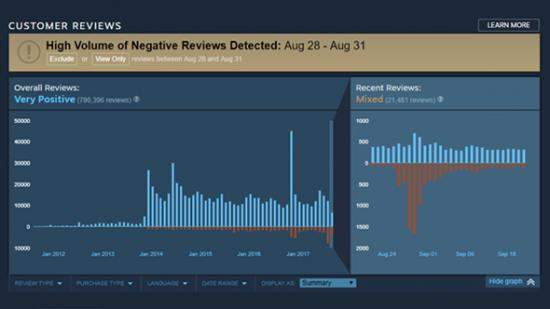Review bombing has become an increasingly prevalent problem on Steam, with users organising in digital mobs to drop tonnes of negative reviews on a Steam game they’re unhappy with. Sometimes there’s a legit reason, like when a developer drops an update that breaks a game. But the most high profile cases have seen people review bombing for reasons entirely unrelated to the game.
Don’t say anything bad about them, because these are best games on PC.
Valve are trying to address the problem by offering a historical graph of positive versus negative reviews over time. They say they’ve found that when review bombing happens as a result of something unrelated to the game, the reviews tend to quickly return to their original ratios of good versus bad. Negative reviews over in-game issues tend to stay the trend over time, and the addition of the graph will help prospective purchasers to see that.
Apparently, Valve toyed with the idea of locking out reviews when a massive influx of negative ones started coming in, but they ultimately decided against that approach. Instead, they believe surfacing more information is the better way to combat review bombing, rather than making a change to how reviews work.
The most recent case of review bombing happened around the narrative adventure game Firewatch, when its developers Campo Santo issued a DMCA complaint against a PewDiePie video of their game after the YouTube star’s public use of a racial slur during a stream.
But Valve have been on the receiving end, too, with review bombing’s recent use against their own Dota 2. Following the reveal of Marc Laidlaw’s apparent story outline for Half-Life 2: Episode 3, old-school Valve fans stormed the Dota 2 reviews effectively blaming it for the death of the company’s once-flagship franchise.
“We don’t want to stop the community having a discussion about the issue they’re unhappy about,” Valve product designer Alden Kroll says in the official announcement, “even though there are probably better places to have that conversation than in Steam User Reviews.”
A few other changes have hit the review sorting system as well. By default, you’ll now see reviews from all owners of the game, regardless of whether they’d purchased it directly through Steam or redeemed a key from another source. Checking the histories of individual reviewers will now show those comments in chronological rather than most helpful order, preventing reviews for the most popular games from always topping the list.
